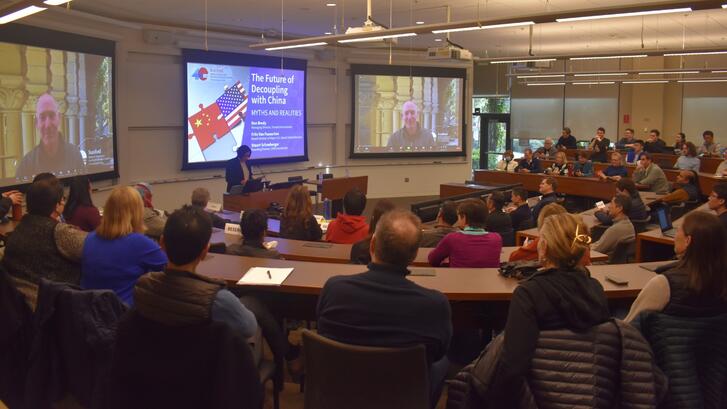The Uncertain Future of Nuclear Deterrence
The Uncertain Future of Nuclear Deterrence
Shorenstein APARC Fellow Thomas Fingar discusses the prospects for arms control and deterrence strategies in an era when the United States is grappling with the challenges of managing a three-way nuclear rivalry and maintaining global stability.

Nuclear deterrence has been a cornerstone of U.S. defense since the end of World War II, but now the United States finds itself grappling with the prospect of managing a three-way nuclear rivalry that is disrupting the deterrence strategies that have successfully prevented nuclear conflict. The confluence of China's military modernization and buildup of its strategic nuclear forces, on the one hand, and Russia's deployment of new armaments and threats to use battlefield nuclear weapons against Ukraine, on the other hand, are forcing policymakers to confront unprecedented challenges in maintaining global stability. Is arms control still possible?
This and other related questions were the focus of a recent discussion about the uncertain future of nuclear deterrence. Hosted by the Commonwealth Club of California, the conversation featured Shorenstein APARC Fellow Thomas Fingar and the Lawrence Livermore National Laboratory’s Center for Global Security Research Director Brad Roberts.
Sign up for APARC newsletters to receive our experts' commentary >
Fingar highlighted the eroded mutual understanding between Russia, China, and the United States since the fall of the Soviet Union as a major challenge to the effectiveness of current deterrence efforts. He stressed the imperative of grasping the nuanced motivations and intentions of these nations, asserting that such comprehension should be an integral component of any successful deterrence strategy. "For deterrence to be effective, it has to be based on a correct understanding of those we seek to deter," Fingar noted.
Regarding Russia, Fingar pointed out the shift in the longstanding assumption, previously accepted by both Washington and Moscow, that the danger of escalation to a nuclear conflict was a check on willingness to engage in a conventional war. “Putin's invasion of Ukraine has erased any confidence in that assumption,” said Fingar. Another significant shift has been the transition from Russian conventional superiority to U.S. dominance in conventional forces, which has compelled Russia to increase its reliance on nuclear weapons for deterrence in its security calculus compared with the Cold War period. Fingar warned that this heightened dependence on nuclear capacity necessitates a refined understanding of Russia's willingness to employ these weapons.
In the case of China, Fingar noted Beijing’s perception of the U.S. as a threat that drives China’s modernization efforts. "They perceive that more is needed to deter the United States militarily, politically, and economically than before."
According to Fingar, missile defense systems and advanced conventional capabilities emerged as shared concerns for both Russia and China. These systems raise uncertainties about the stability of second-strike capabilities and command-and-control structures. Disruption of these structures could challenge China's longstanding commitment to a No-First-Use policy. Furthermore, concluded Fingar, China's refusal to participate in arms control negotiations until the United States and Russia reduce their arsenals to China's unannounced level is “the biggest impediment” to bringing nuclear expansion and modernization under control for all three countries, for U.S. allies, and for all other countries affected by their competition.



